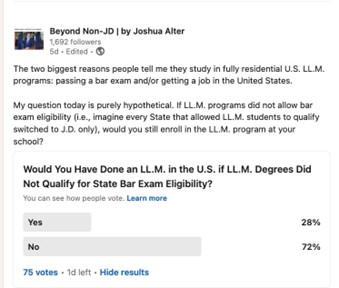Where does the United States fit in the global business of LL.M. programs?
It’s true LL.B. students abroad and foreign-educated lawyers have many options for their LL.M. degrees.
In the U.S., schools look to differentiate their programs as students decide between domestic options. However, the competition happening between jurisdictions interests me just as much, if not more.
U.S. law schools are in a strong position. And two of the biggest selling points don’t even happen in our law schools.
I regularly ask LL.B. students, current LL.M. students in the U.S. and LL.M. graduates about what makes the U.S. stand out. And often, it’s about bar exams and jobs.
This month, I’ll cover bar exams, which presents numerous opportunities for LL.M. students and U.S. law schools. But equally, numerous challenges for both groups.
The bar exam as a recruiting tool
Bar exams are a powerful recruiting tool. Becoming a licensed attorney after an LL.M. degree is a powerful selling point. Numerous students openly share this is an important part of their decisions to choose the U.S. among their options. I even received a LinkedIn recruitment message encouraging me to study in their Online LL.M. as a path to “the bar exam.” (A story for another time.)
I conducted a non-scientific poll on my Beyond Non-JD blog to get a sense of what would happen if U.S. law schools did not have this amazing advantage.
I thought the results would be closer, but it’s a small sample size of self-selecting people on LinkedIn and anyone could have answered the question.

With the pandemic shifting so much information sharing online, you can see that U.S. law schools highlight bar exams in their recruitment pitches.
General LL.M.s are often vehicles for bar exams in New York and elsewhere.
Schools differ about how much they talk about the bar exam in their recruitment and how much they focus on bar exams in their programs.
The bar exam as a benefit
Less than 12 months from orientation, eligible LL.M. students will sit for state bar exams. That is a real benefit. Regardless of your ultimate career goals and navigating U.S. legal hiring, your bar license will stay with you (assuming you stay in good standing and keep up with those CLEs) regardless of where your career takes you. Your firm website will signal that you are a licensed attorney in a U.S. state (possibly more, and possibly federal courts). You will be able to engage your U.S.-based colleagues and network more easily as you work together and across the table on cross-border legal and business matters.
The bar exam as a challenge
The bar exam hook also presents challenges. I covered many of those in a January 2023 International Jurist piece. In short, it is an expensive and time-consuming test that does not reward anything other than passing. It means that you will not be able to take more courses that can help with your specialty area, career goals or interests.
It also leads to other challenges. For LL.B.-LL.M. students who arrive for “the one-year experience” model, it means they are unlikely to qualify for a bar exam. These students generally come through partnerships and maintaining good relationships is important. So if these students speak to their peers about bar exams, for example, they may question why they came a year or two early. Messaging during the LL.B.-LL.M. recruitment and pre-arrival onboarding is important to avoid expectation issues. But even with that, goals change. And that’s just one example.
Law school personnel differ on the purpose of an LL.M. degree. But bar exams also create challenges for law schools.
For example, the bar exams mean that students are viewing the overall experience in your LL.M. through a lens you don’t entirely control. You don’t take the bar exam for them. This creates questions about admissions standards and resources to support LL.M. bar prep.
The way forward? Embrace the bar
Here’s the advantage in the global rush for LL.M. students: enough key U.S. states choose to provide foreign lawyers with a relatively straightforward path to their bar exams. Two semesters and a small number of courses opens the door to sit for the exam alongside J.D. students.
Plenty of schools already embrace the fact that many of their students are interested in passing a state bar exam.
I think it’s time for the entire LL.M. community to do the same or design truly “anti-bar exam LL.M.s” and focus on the students, such as LL.B.-LL.M. students who are not eligible to take the bar exam or others who truly have no interest in the exam.
Conclusion
Bar exams are a great recruiting tool. But the ability to so easily take a bar exam creates real challenges for law schools that only have these students for two semesters. And it creates challenges for students who struggle to pass an exam or learn that they are not eligible to take one or whose goals change during their LL.B.-LL.M. year.
LL.M. students who pass bar exams and become licensed attorneys in the U.S. anecdotally share what a life-changing experience it is.
Speaking with some of the earliest LL.M. students I taught and worked with from 2013-2022 and watching them continue to be successful attorneys in the U.S. is amazing.
Speaking with those who returned home or went to other jurisdictions and continue to practice on cross-border issues is equally fantastic.
And for some, being able to continue to brandish that credential is helpful for them in the next phases of their careers, in business, government, academia and other fields.
If LL.M. students are going to take bar exams, we want them to pass. And I strongly believe that this bar exam benefit will help the U.S. retain the place among jurisdictions in the global race for LL.M. students.


